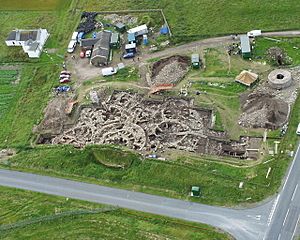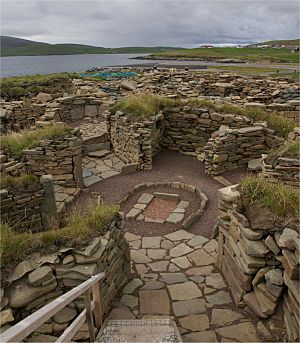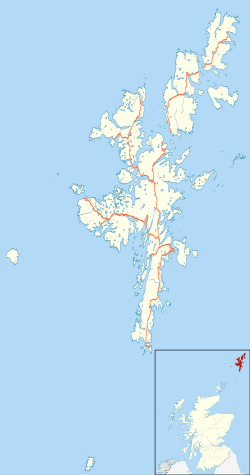Old Scatness facts for kids

Aerial view of the archaeological dig
|
|
| Location | Mainland, Shetland |
|---|---|
| Coordinates | 59°52′44″N 1°18′19″W / 59.879°N 1.3054°W |
| Type | Broch and settlement |
| History | |
| Periods | Iron Age, Pictish, Viking |
Old Scatness is an amazing archeological site in Shetland, Scotland. It's a place where people lived for thousands of years! Imagine, different groups like the Vikings and Picts built their homes here, one on top of another. This site is famous for its ancient Iron Age tower, called a broch. It's located near Sumburgh Airport on the southern tip of Mainland, Shetland.
Contents
Discovering Old Scatness
This incredible site was first found by accident in the late 1970s. Workers were building a new road for the airport when they saw part of an old stone wall sticking out of a grassy hill. It turned out to be a piece of the ancient broch!
Since 1995, experts from the University of Bradford have been carefully digging here. They work with other archaeologists and local helpers. They've found a whole village with buildings from many different time periods. These include the big broch, special roundhouses called wheelhouses, and even later homes.
The Shetland Amenity Trust now looks after Old Scatness. In the summer, you can visit and see people dressed in old clothes. They give tours and show you what life was like long ago. There's also a visitor center with cool exhibits and demonstrations of ancient crafts.
The Amazing Broch
The broch is a tall, round stone tower that still stands several meters high. It's like the main building of the ancient village. People used it for different things over time.
First, they built the main tower. Later, they changed the inside, adding new walls and rooms. Even later, another building was put inside the broch. It had many small, curved rooms around a central area.
Homes West of the Broch

On the side of the broch facing the sea, archaeologists found many homes. The biggest one was a large, round house (called Structure 12). It was about 10 meters wide, and its walls are still over 2 meters tall in some places!
South of this big house was another round home, but it was shaped more like an oval. North of it, there were more buildings. One had seven small "cupboards" built into its inner wall.
Buildings East of the Broch
East of the broch, another large roundhouse (Structure 21) was found. It was about 12 meters wide inside, making it the biggest building on the site. It also had a later wheelhouse nearby.
Archaeologists also found a special building (Structure 5) that was partly underground. It had many small rooms and is a good example of Pictish architecture. The Picts were an ancient people who lived in Scotland.
Later Life at Old Scatness
Even after the Iron Age, people continued to use Old Scatness. Some of the older buildings were used by Vikings, who left behind their tools and items.
Much later, in the 1600s, people built a barn and a corn-drier here. In the mid-1800s, a small farm house, called a crofthouse, was built on the north side of the site. This shows how Old Scatness has been a home for people for thousands of years!
 | Shirley Ann Jackson |
 | Garett Morgan |
 | J. Ernest Wilkins Jr. |
 | Elijah McCoy |


